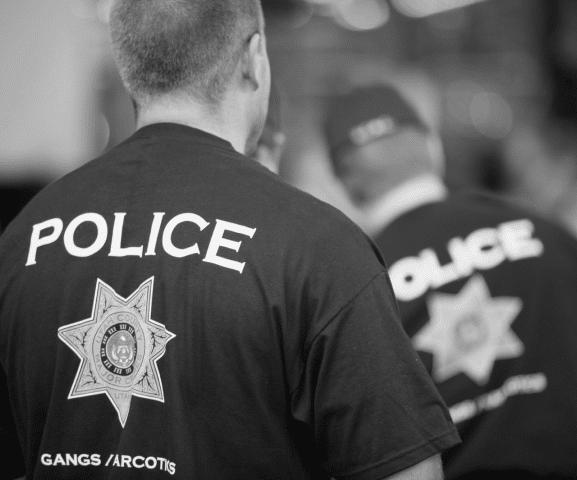Wrongful Death by Police
We count on the police to keep us safe, but sometimes officers operate outside the bounds of the law by engaging in brutality and misconduct. Occasionally, such conduct results in a wrongful death by police. If your loved one has died at the hands of the police, the Police Brutality Center can connect you with an experienced lawyer to explain your legal options, determine who is liable, and advise you how to pursue compensation through a wrongful death lawsuit against the police.
Were you or a loved one a victim of police brutality?
Attorneys that work with Police Brutality Center may be able to assist you.
"*" indicates required fields
Wrongful Death by Police
We count on the police to keep us safe, but sometimes officers operate outside the bounds of the law by engaging in brutality and misconduct. Occasionally, such conduct results in a wrongful death by police. If your loved one has died at the hands of the police, the Police Brutality Center can connect you with an experienced lawyer to explain your legal options, determine who is liable, and advise you how to pursue compensation through a wrongful death lawsuit against the police.
Content Last Updated: March 13, 2025
Content Last Updated: March 13, 2025
Police swear to uphold the law and protect citizens. Many follow their oath to the letter, but some police officers exceed their authority and use excessive force. Occasionally, such police brutality causes a citizen’s wrongful death. In other cases, police negligence causes citizens to lose their lives.
If a police officer acted outside the scope of their authority or was negligent in carrying out their duties, you have the right to pursue compensation. An experienced attorney can help you investigate your wrongful death by police case and fight for compensation.
If you believe that you’ve been the victim of excessive force, you do have rights. There are rights on a state level, and there are rights on a federal level to get compensated for any of your injuries associated with excessive force. There are situations where people are wrongfully arrested and they’re detained and they’re held, and if it turns out that that was an improper, that detainment, there are also potential ways of recovering in a civil court of law. So it’s really important to talk to a lawyer. It’s really important to have them evaluate whether or not you have a claim. It’s really important to be informed of your rights. So take a look at the content on the Police Brutality Center. Call a law firm to evaluate your case. This is super important because there are time constraints under which you can pursue a case, and oftentimes the time in which you have to pursue a police brutality case is less than the typical time to pursue, let’s just say an accident case or a slip and fall or trip and fall. Time is of the essence.
How Police Can Be Liable in Wrongful Death Cases
Citizens can hold the police responsible for wrongful deaths in several situations, including:
- Excessive force, such as lethal choke holds, beatings, or shootings
- Negligence, such as failing to render aid
- Reckless driving in a motor vehicle pursuit
- Detaining someone unlawfully who then dies in custody
- Acting unreasonably under the circumstances and the law
You may have a wrongful death claim against an officer or department even if your loved one wasn’t the target of their actions. For example, police sometimes injure or kill pedestrians during vehicle pursuits. If your case is similar, you may have grounds to file a wrongful death case based on negligence rather than on a civil rights violation.
Options When Filing a Wrongful Death Lawsuit Against Police
Many wrongful death lawsuits against the police are filed in a state court. However, if the police violated someone’s civil rights, victims’ families can file their cases in federal court under 42 U.S.C. § 1983. These are often called Section 1983 claims. You have the option of filing your wrongful death by police claim against the involved officer or officers, or you can choose to sue the police department.
It can be difficult to sue a police department, as you must prove they were negligent in hiring or training or based on specific policies.
For example, the family of Stephon Clark sued the City of Sacramento for not properly training their officers after he was shot seven times by the police in 2018. The officers shot Clark before later determining he was carrying a cell phone, not a gun. The officers did not immediately render aid. The city settled with the family for $2.4 million.
Your attorney generally must overcome defense claims of qualified immunity in cases against the police. This doctrine shields the police from liability if they believe they were lawfully carrying out their duties. This can be an onerous burden to overcome. Even if a court later determines the police used excessive force, they are not liable if they reasonably believed they were acting legally.
Steps To Take After Losing a Loved One to Police Misconduct
There are several steps to take after you lose a loved one to police misconduct. Following them will help preserve evidence crucial to a wrongful death by police claim.

Gather Evidence
Request all police reports and investigative documents. Also, collect any newspaper articles reporting on the incident.
Determining financial damages will likely rely on medical evidence and proof of any financial losses. Gather your loved one’s medical records, earnings statements, and copies of insurance policies. Make sure the documents discuss the relevant medical history. For example, if your loved one had a heart condition and the police denied them access to their medication, they may be responsible in case of death.

Collect Witness Information
Get statements and contact information from people who witnessed the circumstances of your loved one’s death and those who can attest to their character, their actions on that day, or other pertinent information. For example, if the police accused your loved one of fighting them, your attorney may use witnesses to testify that there was no fight before the use of lethal force.

File Your Case Within the Statute of Limitations
The statute of limitations sets the deadline for filing a wrongful death lawsuit. Each state has its own statute of limitations for wrongful death by law enforcement claims. The federal government relies on your state’s statute of limitations if you file a Section 1983 claim.
To determine the statute of limitations applicable to your case, speak with an experienced wrongful death attorney in your state.

Get Legal Help From an Experienced Civil Rights Attorney
Wrongful death claims against the police are not easy to win, and you need a skilled attorney by your side to file your papers on time and argue persuasively in settlement negotiations and court.
The Police Brutality Center has a strong network of relationships with qualified lawyers nationwide who can help you win your case and get the justice you deserve.
Damages Available in a Wrongful Death by Police Case
In a wrongful death lawsuit against the police, you can collect economic and non-economic damages. Economic damages compensate for the current and future financial losses stemming from your loved one’s death. Meanwhile, non-economic damages compensate you for the other effects of your loved one’s death. Damages could include the following:
- Lost wages and future support
- Medical expenses
- Funeral and burial costs
- Loss of future benefits, such as health insurance and inheritance
- Pain and suffering
- Emotional trauma
- Loss of future guidance, companionship, care, love, and support
The average settlement in police misconduct cases varies widely depending on the specific details of your case and where you file your claim. It depends on the severity of the police conduct, the strength of your witness testimony and other evidence, the history of the involved officers, and the history of police misconduct settlements and verdicts in your jurisdiction.
To learn about other cases in your jurisdiction, search for misconduct and police wrongful death settlements in the Thurgood Marshall Institute database. Your attorney can also give you background on the history of these cases in your area and will develop the strategy for your case based on that history.


How an Experienced Civil Rights Lawyer Can Help
It is critical to work with an experienced civil rights lawyer to seek compensation against police officers or a police department. Due to their legal protections, you need an attorney well-versed in state and federal law who can overcome qualified immunity and other defense claims. Some of the ways your lawyer can help include the following:
- Requesting police department records such as past complaints, autopsy reports, body camera footage, and other critical evidence
- Reviewing applicable laws to determine whether to file in state court, federal court, or both
- Determining if the department is also liable
- Consulting with legal and medical professionals to testify in your case
- Preparing you for depositions or in-court testimony
- Interviewing witnesses to the circumstance leading to death
- Filing your case on time to meet state and federal deadlines
- Negotiating with other attorneys or insurance companies to get you a fair settlement
- Fighting for you in court, if necessary
Police may refuse to cooperate by handing over officer disciplinary records, body camera video, or dashcam footage. The city or private businesses may decline to give up other video footage. If necessary, your attorney can ask a court to compel the police department or other parties to provide relevant evidence. In addition, witnesses who are initially reluctant to talk to the police may open up to your attorney.
If you have questions about a loved one’s death at the hands of law enforcement or are ready to file a lawsuit for wrongful death by police, get legal help. The Police Brutality Center helps people nationwide find experienced civil rights attorneys who can help shepherd their cases through the legal system. You and your family do not have to go through this alone.

